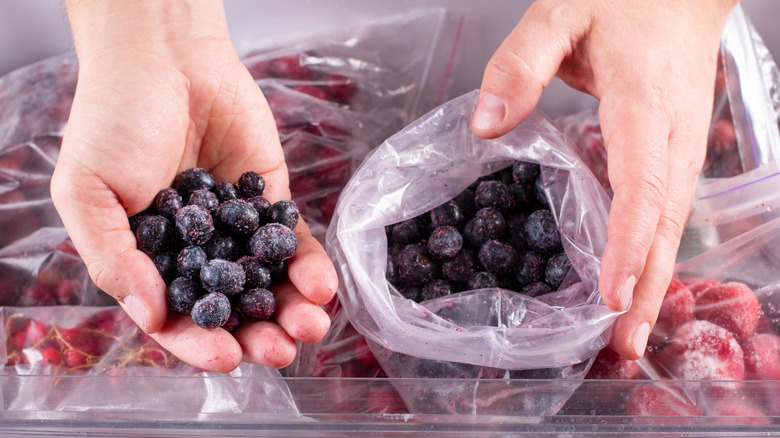The Best Blueberry Storage Is Also The Easiest
Whether you're picking them fresh or buying a basket in the supermarket, the sad truth with blueberries is that they don't last long. But with the right storage, it's possible to keep them fresh for longer than a couple of days — and best of all, storing them right couldn't be simpler.
You'll also want to store blueberries in a container that has airflow in it, as an airtight container can lock moisture in and speed up mold growth or general disintegration. No need to go sourcing something special, though: The pint containers with holes that blueberries are often sold in are perfect. Even if you just throw this container in the refrigerator, you can expect most of your blueberries to still be totally fine to eat for over a week. For this reason, the refrigerator is absolutely the right place for storing blueberries — if stored on the counter, they may only last a day or two.
The most important thing to know is that moisture is the enemy here, so generally speaking, the drier the blueberries, the longer they'll last. To keep moisture levels down in your blueberry container, first, don't rinse them before storage — save that for right before you eat them. If, for some reason, you do have to store blueberries after rinsing, dry them with some paper towel first. Speaking of paper towels, put a sheet or two into the pint container: This can help to absorb extra moisture and extend the berries' lifespan.
Looking out for bad blueberries
No matter how you're storing your blueberries, you'll want to keep an eye out for the bad ones: Even with the right storage methods, you can still generally expect a few berries to get moldy or rotten within a few days (even if most should survive over a week). Any berries with mold should be thrown out, since mold will spread throughout the pint.
There are some less obvious signs, too: Berries that are soft and squishy, or which are leaking juice may be in the early stages of spoilage, so it's best to throw them out. Wrinkly berries are also a sign of this, so ditch them too. A sour or fermented smell may also be a sign of bad blueberries, although realistically, sniffing each individual blueberry for signs of this may be a little excessive. If you're buying blueberries at the store, you should watch out for pints that have these kinds of wrinkly or moldy berries and avoid them — again, so they last longer.
How to freeze blueberries
If you want your blueberries to last up to 10 months, you can freeze them — and as a bonus, a South Dakota State University study suggests that you may be able to get more antioxidants out of frozen blueberries as compared to their fresh counterparts. You'll want to pick out any bad ones and spread the remaining blueberries out on a sheet pan or something similar. Put that in the freezer and let them freeze for a few hours or overnight, then you can move all the berries to an airtight container. Freezing them spread out like this makes sure they don't clump together in the container you plan to keep them in. Again, you'll want to avoid moisture, so don't wash the berries before freezing them (or if you must, make sure they're thoroughly dried), as ice can form on the berries' exterior, damaging their texture.
Be aware that when frozen, ice crystals will form inside berries, and these often mess with the structure of the fruit, making them a bit squishy when thawed. For this reason, it's often recommended to use frozen berries in recipes where they're thoroughly incorporated, such as smoothies or baked goods like muffins, though they're still totally fine to eat as-is.


